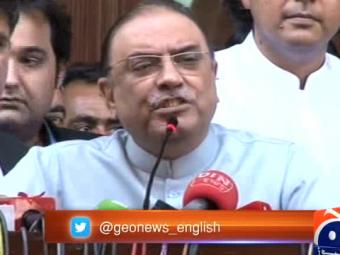Pakistan Tehreek-e-Insaf (PTI) Chairman Imran Khan in a press conference said: “There is no difference in Dawn Leaks, Memogate scandal and Hussain Haqqani’s claim. Our rulers secretly convey messages to foreign leaders and India that we stand with you but Pakistan army is not under our control. This is called the real treason. On one hand, we send secret messages badmouthing our armed forces but on the other hand publicly state we and army are on same page.” Since Hussain Haqqani’s article was published in the Washington Post on March 10, a war of words has started between the PML-N and PPP leaders. They are blaming each other for having connection with Hussain Haqqani, and both call him a traitor. Of course, Hussain Haqqani did not say anything new, and repeated what he had been saying in the past.
The debate started in print and electronic media after Adviser to the Prime Minister on Foreign Affairs Sartaj Aziz on Tuesday said in the Senate that the PPP had formally empowered Hussain Haqqani to directly issue visas to Americans entering the country. PPP stalwarts retaliated and raised many questions. Senate Chairman Mian Raza Rabbani said that Pervez Musharraf, during his days as president, had allowed Americans to use the cargo entrance of the Benazir Bhutto International Airport to enter Pakistan without visas, skipping immigration and customs procedures. Defending former president Asif Ali Zardari, PPP Senator Farhatullah Babar said there was no new revelation in Haqqani’s article, adding that hype is being deliberately created to malign and tarnish Zardari’s image. The senator also demanded that the Abbottabad Commission report be made public, pointing out that the body must have investigated who exactly issued the visas and how.
In his article under reference, Hussain Haqqani stated that he had facilitated presence of CIA operatives in Pakistan by acting under the authorization of PPP government, which helped track down Osama bin Ladin without the knowledge of Pakistani military. Anyhow, Minister for Defence Khawaja Asif on Wednesday proposed formation of a parliamentary commission to investigate into the claims made by Hussain Haqqani. Leader of the Opposition in National Assembly Syed Khursheed Shah called Hussain Haqqani a traitor. He welcomed the proposal for formation of the commission to probe his allegations, and said that the commission should also determine who called Osama Bin Ladin to Pakistan in the first place; who facilitated him, and who asked him for help. Though the Judicial Commission’s report on Memogate has not been made public, but Al Jazeera had published parts of the report, which has not been denied.
Anyhow, a resolute probe conducted by the Judicial Commission had concluded that the memo was authored by Hussain Haqqani former Pakistan ambassador to the US. The report confirmed that former Ambassador to the US Hussain Haqqani was not a trustworthy person and has been disloyal to the state. The sealed report presented by Memo Commission was read out to the apex court’s nine-member bench, and it was observed that the former ambassador was not loyal to the country. The memo authored by Hussain Haqqani had accused then army chief General Ashfaq Pervez Kayani of planning to bring down the government in the aftermath of the raid on Osama bin Laden on May 2. Hussain Haqqani, in his book ‘Pakistan between Mosque and military’ published in 2005, had analyzed and traced the origins of the relationships between Islamist groups and military; and denigrated Pakistan’s institutions.
Anyhow, Hussain Haqqani was appointed ambassador in April 2008; however between 14th July and 31st December 2010, reportedly 3000 visas were issued to dubious US officials arbitrarily after PM’s letter of authorization. Visa holders were suspected of being involved in espionage and other anti-state activities in Pakistan. To avoid identification by the security agencies, these individuals had been providing fake addresses in their visa applications. The case in point was the issuance of visa to Raymond, who was issued visa in September 2009 without approval from Ministry of Foreign Affairs and security clearance. Already in December 2009, American officials were angry and growling that their diplomats are being harassed. They expected that their diplomats or operatives could move freely in vehicles with fake number plates and loaded with weapons to make videos of sensitive installations in our cantonments.



